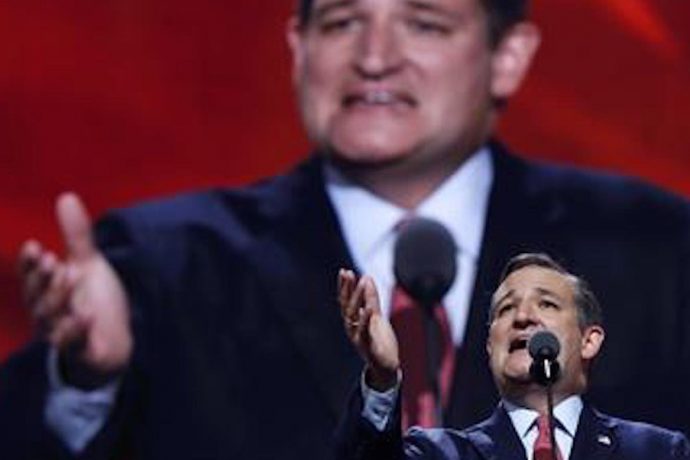Last night, Ted Cruz preached a message of conscience and principled conservatism to the Republican National Convention. He was met with an almost deafening chorus of boos and jeers.
In another election cycle, Cruz’s call to conscience receiving only disdain from a gathering of Republican delegates might seem more shocking, but there’s little left to scandalize after the horrors of this campaign year.
Still, it’s worth pointing out how clearly last night demonstrated the awful truth of a Republican Party that has succumbed to Trumpism. Assimilation in the guise of “unity” now represents the party’s sense of virtue. Conscience and even a coherent conservatism have become a vice.
To be sure, elements of Cruz’s address–much like Cruz’s politics writ large–were odious and self-serving.
Cruz opened his speech telling of Caroline, the young Texas girl who had hugged her police officer father for the last time before he was gunned down in the recent Dallas police shooting. The crowd grew quiet listening to the account, appropriately moved.
But Cruz quickly pivoted to his smarmy and self-satisfied ways. “What if this right now is our last time? Our last moment to do something for our families, and our country?” Cruz asked. He had just compared a presidential election to a nine-year-old child’s loss of her father.
Given those stakes, the crowd expected Cruz would build to an endorsement of Donald Trump. But Cruz did not come to Cleveland to back the man who harassed him as “Lyin’ Ted,” suggested his father had been involved in JFK’s assassination, and made disparaging comments about his wife’s looks.
Instead, he staked out a thorough defense of conservatism, what Benjamin Wallace-Wells writing for The New Yorker rightly called “the most exact statement of the prevailing conservative ethos offered yet in this election.”
Cruz also spoke for unity–the buzzword of the evening. But Cruz envisioned unity around a set of conservative ideals, rather than behind a demagogic figure as the other evening’s speakers had demanded.
“We will unite the country by standing together for shared values, by standing for liberty,” Cruz concluded as the crowd howled in protest.
A party that had once cheered as Barry Goldwater famously declared “extremism in the defense of liberty is no vice,” now booed an advocate of liberty against an agent of extremism.
Following the speech, the chattering classes responded in the most predictable ways, assessing the politics of the moment rather than Cruz’s argument itself. For a media that looks at elections as little more than horse races, such reactions are hardly surprising.
Talking heads could only wonder what this meant for Cruz’s presidential prospects in 2020. “He’s over politically,” many of them declared. Others tsk-tsked at Cruz’s poor manners to not endorse the nominee. On his show this morning, Joe Scarborough blasted Cruz for coming to “Trump’s convention” and not offering an endorsement.
But this is not Trump’s convention. It is the party’s convention. And Cruz came not to speak of politics, but of principle.
That principle is a questionable one, for sure, and often reactionary and worse.
But far more troubling than a Republican Party that pushes for extreme conservative principles is a party that lines up behind a demagogic extremist and suppresses principled dissent.
For all but a dwindling #NeverTrump crowd, Ted Cruz has been deemed a “loser,” to borrow a phrase, by the Republican rank and file.
We should be far more worried, however, by whom they have judged the winner.





